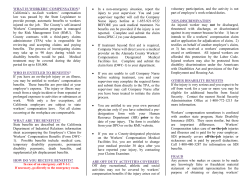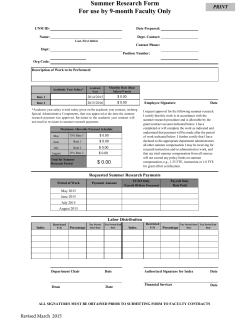
the sales compensation conundrum
THE SALES COMPENSATION CONUNDRUM How Compensation Impacts Sales Organization Quality and Performance Written & Researched by Steve W. Martin Sales Expert, HBR Contributor, and Author of the Heavy Hitter Sales Series Nick Hedges President CEO of Velocify The Sales and Compensation Conundrum 1 About the Authors About Steve W. Martin Steve W. Martin is an expert on the human nature of complex sales. His “Heavy Hitter” series of books for senior salespeople has helped over 100,000 salespeople become top revenue producers. His new book is titled Heavy Hitter I.T. Sales Strategy: Competitive Insights from Interviews with 1,000+ Key Information Technology Decision Makers and Top Technology Salespeople. Steve is a regular contributor to the Harvard Business Review and teaches at the University of Southern California Marshall School of Business MBA Program. You can learn more about Steve at www.stevewmartin.com. About Nick Hedges Nick Hedges is the president and CEO of Velocify and a 15 year veteran of the Internet and software as a service (SaaS) industry. Nick has spent the last seven years at Velocify helping organizations accelerate sales performance and is a widely-recognized thought leader with respect to technology’s transforming impact on the sales profession. Nick is also a regular contributor to Inc.com, where he writes a column called Sales Acceleration. For more on Nick, visit http://velocify.com/company/leadership/ The Sales Compensation Conundrum 2 How Compensation Impacts Sales Organization Quality and Performance Salespeople and sales leaders alike know that compensation can be a strong motivator, but it usually comes at a high budgetary cost. This leads many to ask what the real impact of compensation might be on overall sales professionals’ satisfaction and performance. This study explores the answer to that question. Nearly 800 sales professionals participated in a sales organization performance study by completing an extensive 42-question survey. Participants were asked to share their opinions on their sales organization and personal details on their company’s compensation. In exchange for their candor, it was agreed their names and organizations would remain anonymous. Twenty-two percent of survey participants were toplevel sales leaders, such as vice president of sales; 14 percent front-line sales managers, who manage salespeople; 17 peaent were hybrid sales managers, who sell directly to customers and manage other salespeople; and 47 percent were salespeople, who carry their own quota. Study Participants by Role 47 % 22 % Quota-Carrying Salespeople Top-Level Sales Leaders 14 % 17 % The Sales Compensation Conundrum Front-Line Sales Leaders Hybrid Sales Leaders 3 How Compensation Impacts Sales Organization Quality and Performance The industries represented in the survey in order by number of participant responses were financial services, high technology, business services, manufacturing/ distribution, education, retail/hospitality, media/ entertainment, healthcare, and energy/utilities. for an industry leader with significant market share in their field, 32 percent for a well-known company within their market space, 29 percent for a lesser known company who has to compete against well-known rivals, and 18 percent for a relatively young company trying to establish market presence. Study participants were asked to describe their company’s market position. Twenty-one percent worked What best describes your company? 18 % 29 % A relatively young or unknown company trying to establish market presence A lesser known company who has to compete against well-known rivals The Sales Compensation Conundrum 21 % An industry leader with significant market share in our field 32 % A well-known company within our market space 4 How Compensation Impacts Sales Organization Quality and Performance Top-level sales leaders and sales managers were asked to categorize their company’s compensation compared to other companies within their industry. Twenty-eight percent indicated their company’s compensation was higher than market average, 60 percent were at market average, and 12 percent were below average market average. Each category of compensation was then analyzed from a number of different perspectives to determine the impact of compensation on sales organization performance. Sales leaders, how does your company’s compensation compare to others within your industry? Below Average Market Compensation Above Average Market Compensation 12 % 28 % $ 60 % Average Market Compensation The Sales Compensation Conundrum 5 Revenue Growth Tied to Compensation Seventy-three percent of sales leaders at companies that compensate above market level reported increased revenue from 2013 to 2014, compared to 60 percent of sales leaders that compensate below market level. Conversely, 40 percent of sales leaders at companies that compensate below market level reported flat or decreased revenue, compared to 27 percent of sales leaders that compensate above market level. Sales leaders, how did your company’s annual revenue last year compare to annual revenue the year before? 60% Below Average Market Compensation 40% 73% Above Average Market Compensation 0% 10% 20% 30% 40% 27% 50% 60% 70% 80% 90% 100% Percentage of respondents Increased Revenues The Sales Compensation Conundrum Flat or Declining Revenues 6 Compensation Associated with Sales Organization Excellence Forty percent of sales leaders at companies that compensate above average market average rated their sales organization as excellent compared to 16 percent at average compensation and 8 percent at below average market compensation companies. Conversely, 57 percent of sales leaders at companies that compensate below market rated their sales organization as average or below average compared to 34 percent at average compensation and only 16 percent at above average market compensation companies. Sales leaders, how would you rate your sales organization? Excellent Sales Organization Above Average Sales Organization Average Sales Organization Below Average Sales Organization 0% 10% 20% 30% 40% 50% 60% Percentage of responses Above Average Market Compensation The Sales Compensation Conundrum Average Market Compensation Below Average Market Compensation 7 Perceived Quality of Sales Leadership Is Directly Related to Compensation Thirty-eight percent of salespeople who sell for above market compensation companies rated their sales leadership as excellent compared to only 2 percent of salespeople at below average market compensation companies. Conversely 22 percent of salespeople at below average market compensation companies rated their sales leadership as below average compared to only 4 percent of salespeople at above average market compensation companies. How would you rate your sales leadership? Excellent Above Average Average Below Average 0% 10% 20% 30% 40% 50% 60% Percentage of responses Above Average Market Compensation The Sales Compensation Conundrum Average Market Compensation Below Average Market Compensation 8 Sales Organization Morale Is Directly Tied to Compensation Sixty-six percent of sales leaders at above average market compensation companies rated the morale across their sales organization as excellent compared to only 21 percent at below average market compensation companies. Conversely, 27 percent of sales leaders at below average market compensation companies rated morale as below average compared to only 4 percent at above average market compensation companies. Sales leader, how would you rate the morale across your sales organization? Higher than most organizations About the same as most organizations Lower than most Average organizations 0% 10% 20% 30% 40% 50% 60% 70% Percentage of responses Above Average Market Compensation The Sales Compensation Conundrum Average Market Compensation Below Average Market Compensation 9 Compensation Impacts Sales Organization Culture Thirty-seven percent of sales leaders at above average market compensation companies described their sales organization as “a cohesive group of likeminded individuals” compared to only 23 percent at below average market compensation companies. Conversely, 42 percent of sales leaders at below average market compensation companies described their sales organization as “a loose collection of individuals” compared to 23 percent of sales leaders at above average market compensation companies. Sales leaders, what best describes the composition of your sales organization? A cohesive group of like-minded people A team of seasoned professionals A loose collection of individuals 0% 5% 10% 15% 20% 25% 30% 35% 40% 45% Percentage of responses Above Average Market Compensation The Sales Compensation Conundrum Average Market Compensation Below Average Market Compensation 10 Companies Where Compensation Was Not Capped Reported Higher Quota Attainment Rates Seventy-nine percent of sales managers reported achieving their annual quota last year at companies where compensation was not capped compared to 72 percent of sales leaders at companies where compensation was capped. Fifty-one percent of salespeople achieved their annual sales quota at companies where compensation was not capped compared to 48 percent at companies where compensation was capped. Is compensation capped at your company? Sales manager average quota attainment Sales managers reporting the percentage of their salespeople who made quota 0% 10% 20% 30% 40% 50% 60% 70% 80% Percentage of respondents Not Capped The Sales Compensation Conundrum Capped 11 Companies Where Compensation Was Not Capped Reported Higher Quota Attainment Rates When the impact of capping compensation is analyzed for all study participants, the results suggest companies that achieved lower percentages of their revenue targets were more likely to cap compensation. Percentage of companies where compensation is capped Revenue target attainment of companies that cap compensation 40% 35% 30% 25% 20% 15% 10% 5% 0% <50% 50%-79% 80%-99% 100% Percentage of revenue target attained The Sales Compensation Conundrum 12 Final Thoughts The study results substantiate that different sales force compensation strategies can greatly impact the performance and quality of sales organizations. Decisions about whether to cap compensation and whether to pay the sales force above market average, at market average, or below market average can have a substantial effect on revenue growth, company excellence, quality of sales leadership, morale, culture, and quota attainment. Like this study? Share it. About Velocify Velocify is a market-leading provider of cloud-based intelligent sales software, designed for high-velocity sales environments. Velocify helps sales teams keep pace with the speed of opportunity and increase revenue by driving rapid lead response, increased selling discipline, improved productivity, and actionable selling insights. The company has helped more than 1,500 companies across a variety of industries improve customer acquisition practices and sales performance. Velocify was recently recognized as one of the fastest growing companies in North America by Deloitte and a Best Place to Work by the Los Angeles Business Journal. For more information, please visit velocify.com or follow the company on Twitter @Velocify. Contact Sales: 888-843-1777 l sales@velocify.com Subscribe to our blog: velocify.com/blog The Sales Compensation Conundrum velocify.com 13
© Copyright 2025








